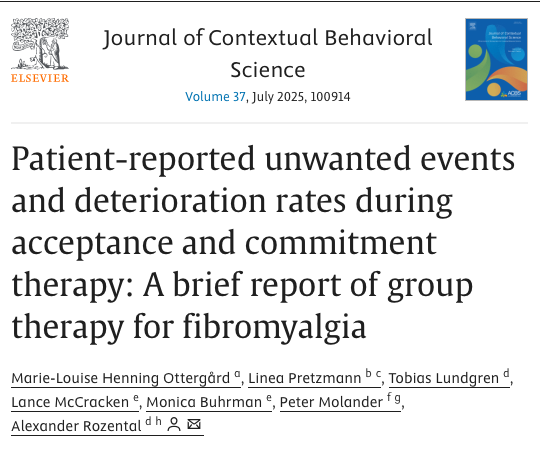Journal of Contextual Behavioral Science (JCBS)
Volume 37, July 2025
Authors
Marie-Louise Henning Ottergard, Linae Pretzmann, Tobias Lundgren, Lance McCracken, Monica Buhrman, Peter Molander, Alexander Rozental
Key Findings
- Almost half of all patients reported unwanted events during and following treatment.
- Unwanted events during treatment were not associated with treatment outcome.
- Deterioration rates were generally low.
Abstract
Fibromyalgia is a type of generalized chronic pain condition that causes physical tenderness, fatigue, sleep disturbance, cognitive impairment, and comorbid psychiatric symptoms. Medication and psychotherapy can offer some relief. Acceptance and Commitment Therapy (ACT) is a current treatment approach that focuses on fostering acceptance of symptoms and engagement in meaningful, value-driven activities. However, no systematic attempts at investigating unwanted events and deterioration have been made in relation to ACT for fibromyalgia. This brief report presents findings on the occurrence of characteristics of such incidents in a group-based ACT-treatment at a specialized pain clinic. Among the 94 patients included, deterioration rates were generally low across most outcome measures. Unwanted events were monitored using the 32-item Negative Effects Questionnaire, a self-report measure covering symptoms, treatment quality, dependency, stigma, hopelessness, and failure. A total of 37.6 % reported having experienced unwanted events during the treatment period, and 43.2 % at post-treatment. Among the most frequently occurring unwanted events reported at post-treatment were “Unpleasant memories resurfaced” (12.7 %), “I experienced more unpleasant feelings” (9.9 %), and “I feel like I am under more stress” (8.3 %). However, unwanted events reported during treatment were not related to treatment outcome. The results point to the importance of monitoring unwanted events during treatment, although these experiences may not interfere with benefits participants obtain, and, presumably, may be part of the theorized change process. Further research is warranted to understand how unwanted events and deterioration might affect adherence and dropout.
